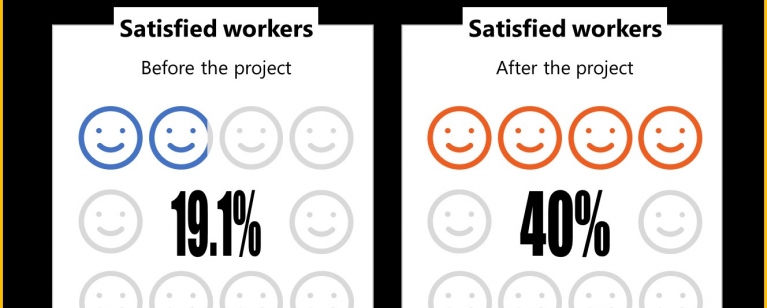
The management of a large garment factory in China were concerned that if they failed to better understand and listen to their workers' needs, then worker dissatisfaction would increase.
The factory had no negotiation mechanism in place, and little idea where to start. Timeline Consultancy explained the benefits of negotiation to both managers and workers, and established negotiation mechanisms clarifying how to recruit worker representatives, what their roles and responsibilities are, how to determine topics for discussion, reach negotiation agreements, and follow up on the implementation of agreements.
The factory ran a successful publicity campaign to encourage women workers to put themselves forward for election as worker representatives: in the end, 18 representatives were elected, and 15 of them were women.
In the beginning, the female worker representatives were reluctant to speak and contribute, so the factory organised training sessions outlining workers’ rights and obligations, and how a worker representatives committee operates. Timeline also organised specific training for the worker representatives aimed at improving their communication and negotiation skills.
One of the "wins" to come out of the new worker representative committee is the provision of school transport for workers' children by the factory. This has led to a reduction in absences, improved workers' work-life balance, and enabled workers to earn more and access career development opportunities.
“I didn’t know how to communicate with managers before, but now I do”.
Benefits to the women workers
- Women workers (freely elected by frontline workers with out management intervention) in the majority on the new worker representative committee
- Guaranteed participation in decision-making
- Improved confidence and communication skills among women worker representatives
- Better work-life balance
- Increased earning potential and access to career development opportunities
Benefits to the factory
- One year on, employees satisfaction with the factory’s worker-management communication has risen from 20% to 43%
- Workers more willing to use internal grievance channels to raise issues - with percentage of workers seeking help from the local labour bureau for rights violations at work falling from 24.3% to 9.8%
- Factory able to respond to needs of female workers in a more timely manner
- More effective policies, informed by women workers' needs
- More accurate and effective allocation of resources
“After communication and negotiation with the female representatives, we have reached a result that is satisfactory to both parties. The number of leave requests due to picking up children has been reduced, accompanied by the improved production efficiency. Because the factory provides employee welfare of sending children to school and picking them up from school, it has attracted more new employees and the recruitment process is smoother." Factory manager
